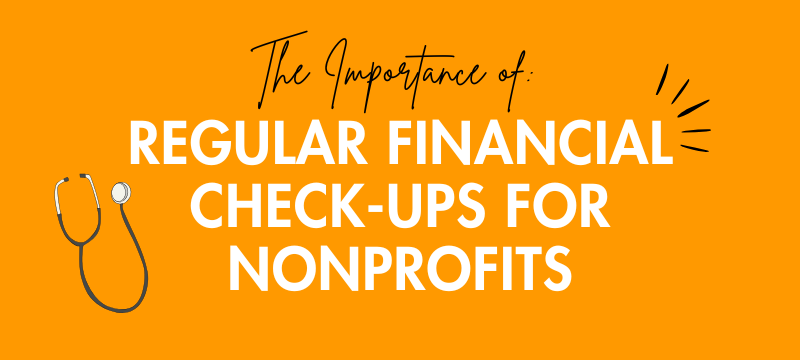In November 2020, CBC News highlighted a common situation Canada-wide - individuals in positions of…

How Regular Check-Ups Help Ensure Non-Profit Financial Reporting Success
The Importance of Regular Financial Check-Ups for Nonprofits
We’re wired to schedule annual medical check-ups to ensure we’re healthy. For my mother, this routine habit turned out to be life-saving. She had gone to her doctor for what she thought would be a standard preventative check-up—nothing out of the ordinary. But during the visit, her doctor suggested further tests, just to be thorough. Those tests revealed early-stage breast cancer.
Thanks to that check-up, she caught it early, received treatment right away, and today, she’s fully cured. It’s a powerful reminder that sometimes, we only realize the value of regular check-ups when they uncover something critical.
As nonprofit leaders, your focus is often pulled in countless directions—advocating for your cause, managing programs, engaging donors, and ensuring your mission stays at the heart of your operations. In the midst of this hustle, it’s easy to let financial management take a back seat. However, just like regular health check-ups are essential for your well-being, regular financial check-ups—including a thorough review of your non-profit financial reporting—are critical for the health of your organization.
Why Nonprofits Need Financial Check-Ups
Nonprofits operate in a unique environment where every dollar matters. With tight budgets, fluctuating funding sources, and complex compliance requirements, it’s not enough to set financial processes on autopilot. Regular financial check-ups help:
- Ensure Compliance: A nonprofit we worked with was unaware that their grant funds needed separate tracking. During a financial check-up, we identified compliance gaps, corrected the process, and helped them avoid potential penalties.
- Optimize Resources: Another organization discovered they were overspending on duplicate software subscriptions. Our review uncovered these inefficiencies, saving them thousands of dollars annually.
- Mitigate Risks: In one instance, a routine check revealed irregularities in payroll processing for a nonprofit. By addressing the issue early, we prevented further errors and strengthened their internal controls.
- Support Strategic Growth: A small nonprofit aiming to expand its programs needed clear financial insights to plan ahead. Our analysis of their reserves and non-profit financial reporting gave their leadership the confidence to take the next step.
What Should a Financial Check-Up Include?
A comprehensive financial check-up goes beyond reviewing your income statement. Here are key areas to focus on:
- Cash Flow Analysis: For example, one nonprofit found they were cutting it too close with cash reserves during grant reimbursement cycles. A cash flow review helped them plan for smoother operations.
- Budget Tracking: We’ve seen organizations miss opportunities for funding because they didn’t know they were underspending in critical areas. Tracking budgets ensures you’re maximizing your impact.
- Grant and Fund Restrictions: One nonprofit unintentionally used restricted funds for general expenses, leading to donor concerns. By implementing better tracking systems, they restored trust and compliance.
- Payroll and Benefits: For a mid-sized nonprofit, we identified significant savings by renegotiating benefits plans and streamlining payroll processes.
- Internal Controls: We helped an organization with multiple volunteers set up simple safeguards, like dual approval for transactions, to reduce the risk of fraud.
- Future Planning: A nonprofit nearing the end of a multi-year grant needed to plan for the funding gap. Through careful analysis, we helped them create a sustainability plan.
How Often Should You Conduct Financial Check-Ups?
The frequency of financial check-ups depends on your organization’s size and complexity, but as a rule of thumb:
- Monthly: Review cash flow, expenses, and budget variances.
- Quarterly: Dive deeper into financial reports, grant compliance, and internal processes.
- Annually: Conduct a full financial audit or review, prepare year-end reports, and reassess your strategic financial plan.
Why Partnering with Experts Makes a Difference
Managing a nonprofit’s finances can be overwhelming, especially when resources are stretched thin. This is where outsourcing financial expertise can make a big impact. At OTUS Financial Solutions, we specialize in providing tailored support to nonprofits, from conducting in-depth financial reviews to ensuring accurate and compliant non-profit financial reporting.
We understand the challenges nonprofits face, and our goal is simple: to be Your Nonprofit’s Financial Experts, offering the guidance and tools you need to thrive.
Take Action Today
When was the last time your nonprofit had a financial check-up? If it’s been a while—or if you’re not sure where to start—let’s connect. A proactive approach today can help secure the future of your mission through improved non-profit financial reporting and overall financial health.



